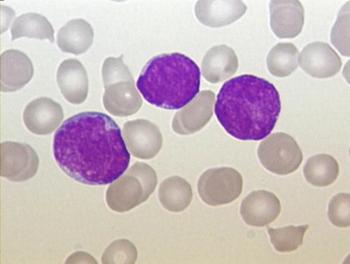
Disparities in pediatric cancer survival in Europe might be mitigated through cross-border care, twinning programs, and use of pan-Europe cancer control plans.

Your AI-Trained Oncology Knowledge Connection!


Ariana Pelosci, managing editor for CancerNetwork® and the journal ONCOLOGY®, has been with the team since June 2021. She specializes in both web and print, and runs the social media accounts for CancerNetwork®.
She graduated from the University of Delaware, where she studied Media Communications and minored in journalism and marketing. At heart, she is a Jersey girl, and you can always find her down the shore during her free time.
Ariana loves to read, specifically historical or contemporary fiction. Follow Ariana on Twitter @APelosci or email her at apelosci@mjhlifesciences.com.

Disparities in pediatric cancer survival in Europe might be mitigated through cross-border care, twinning programs, and use of pan-Europe cancer control plans.

All patients with platinum-resistant, small-cell neuroendocrine prostate cancer who responded to treatment with BXCL701 plus pembrolizumab were microsatellite stable and/or tumor mutational burden–low with a low probability of response to pembrolizumab.

Polatuzumab vedotin-piiq plus R-CHP was found to produce clinical efficacy in phase 3 POLARIX trial in patients with previously untreated diffuse large B-cell lymphoma, leading to an 11-to-2 vote from the FDA’s Oncologic Drug Advisory Committee.

Patients with advanced clear cell renal cell carcinoma are “unlikely” to experience a clinically meaningful decrease in overall survival following planned treatment cessation with a tyrosine kinase inhibitor.

A prefilled autoinjector presentation of pegfilgrastim-cbqv, a pegfilgrastim biosimilar, has been approved by the FDA for patients with cancer undergoing chemotherapy who may experience febrile neutropenia.

Results from cohort A of the HCRN GU16-260 trial showed treatment-free survival was enhanced in patients with advanced renal cell carcinoma who received nivolumab monotherapy plus salvage nivolumab and ipilimumab maintenance.

An expert from the University of Texas MD Anderson Cancer Center says that ponatinib plus reduced-intensity chemotherapy may be a new standard of care for frontline Philadelphia chromosome–positive acute lymphoblastic leukemia.

Survival appears to be significantly improved when idecabtagene vicleucel is given vs standard of care in relapsed/refractory multiple myeloma.

An expert from Dana-Farber Cancer Institute speaks not only to racial disparities in access to opioids for end-of-life cancer care but gender/racial discrepancies, as well.

In a meeting with the FDA’s Oncologic Drugs Advisory Committee experts discussed findings that have read out with regard to dostarlimab for patients with mismatch repair deficiency/microsatellite instability–high locally advanced rectal cancer.

During a live Tweet Chat, Hope S. Rugo, MD, and Paolo Tarantino, MD, reviewed a patient case and discussed current standard of care for those with metastatic triple-negative breast cancer.

Patients with pre-treated, unresectable locally advanced or metastatic hormone receptor-positive, HER2-negative breast cancer can now receive treatment with sacituzumab govitecan following approval from the FDA.

The approval for pirtobrutinib in the treatment of patients with relapsed or refractory mantle cell lymphoma was based on data from the phase 1/2 BRUIN trial.

The FDA approved adjuvant pembrolizumab for the treatment of patients with resected non–small cell lung cancer, based on data from the phase 3 KEYNOTE-091/EORTC-1416-LCG/ETOP-8-15-PEARLS trial.

Under a new FDA initiative, the agency recently updated a decades’ old approval of the chemotherapy capecitabine. This move, according to an expert, will springboard further change in the treatment of cancer.

The findings, according to a group of researchers, warrant the development of treatments that attack HER2-low advanced gastric cancer.

The FDA based its accelerated approval of tucatinib and trastuzumab combination therapy for HER2-positive metastatic colorectal cancer on results from the phase 2 MOUNTAINEER trial.

Experts present patient cases of those with transplant-eligible or ineligible multiple myeloma and discuss the current standard of care treatment, and how to apply it to their patients.

The FDA’s decision to approve mosunetuzumab marks the first bispecific antibody approved to treat follicular lymphoma.

Results from the phase 2 ARC-7 trial found that zimberelimab, etrumadenant, and domvanalimab enhanced efficacy outcomes in patients with advanced non–small cell lung cancer.

During the 2022 San Antonio Breast Cancer Symposium, Neil M. Iyengar, MD, took over the CancerNetwork® Twitter to review key presentation takeaways.

Patients with KRAS G12C–mutated non–small cell lung cancer can now receive adagrasib therapy following the treatment’s recent accelerated approval by the FDA.

The phase 2 ELARA trial indicated continued durable responses when patients with relapsed/refractory follicular lymphoma were treated with tisagenlecleucel.

The 5-year follow-up of the phase 3 AUGMENT trial produced enhanced progression-free survival when lenalidomide plus rituximab was used to treat patients with relapsed/refractory indolent non-Hodgkin lymphoma.

Results from the phase 3 CAPItello-291 trial indicated that the combination of capivasertib plus fulvestrant produced improved progression-free survival in patients who have hormone-receptor–positive/HER2-negative advanced breast cancer.

Results from a phase 2 trial indicated that subgroups of patients with advanced or metastatic sarcoma may benefit from durvalumab plus tremelimumab, with data encouraging further evaluation in the population.

Results from the ongoing phase 2 IMMUNOCERV trial showed that treatment with the investigational drug PDS0101 — a vaccine — combined with chemotherapy and radiation induced a 100% clinical response in a small group of patients with stage IB3 to IVA cervical cancer.

The FDA has granted mirvetuximab soravtansine-gynx an accelerated approval for the treatment of patients with folate receptor-α-positive platinum-resistant ovarian cancer based on results from the phase 3 SORAYA study.

Data from a study indicated that durable minimal residual disease negativity was associated with stool butyrate production in patients with multiple myeloma who had plant-based diets undergoing treatment with lenalidomide maintenance.

The FDA has approved tremelimumab plus durvalumab for patients with metastatic non–small cell lung cancer based on findings from arms 1 and 3 of the phase 3 POSEIDON trial.